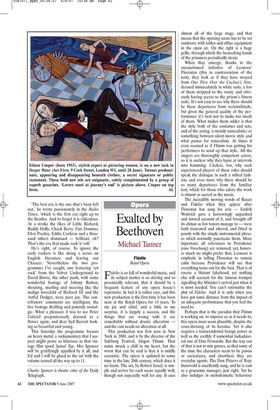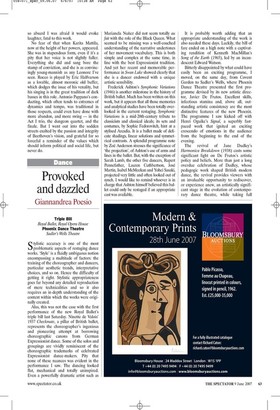Exalted by Beethoven
Michael Tanner Fidelio Royal Opera Fidelio is so full of wonderful music, and its subject matter is so stirring and so perennially relevant, that it should be a frequent feature of any opera house's repertoire. In fact it is rather rare, and this new production is the first time it has been seen at the Royal Opera for 14 years. To my joy and relief, and a little to my surprise, it is largely a success, and the things that are wrong with it are remediable without drastic alteration — and the cast needs no alteration at all.
This production was first seen in New York in 2000, and is by the director of the Salzburg Festival, Jurgen Flimm That name struck a chill in my heart, but the worst that can be said is that it is mildly eccentric. The opera is updated to some time in the late 20th century, which does it no harm. The set, by Robert Israel, is simple and serves for each scene equally well, though not especially well for any. It uses almost all of the large stage, and that means that the opening scene has to be set outdoors, with tables and office equipment in the open air. On the right is a huge grille, through which the beseeching hands of the prisoners periodically strain.
When they emerge, thanks to the unsanctioned initiative of Leonore/ Florestan (this in contravention of the text), they look as if they have strayed from One Flew Over the Cuckoo's Nest, dressed immaculately in white suits, a few of them stripped to the waist, and obviously having access to the prison's fitness suite. It's not easy to see why there should be these departures from verisimilitude, but given the general quality of the performance it's best not to make too much of them. What makes them odder is that the style both of the costumes and sets, and of the acting, is mainly naturalistic; or something between silent-movie style and what passes for naturalism. At times it even seemed as if Flimm was getting his performers to send up that style. All the singers are thoroughly competent actors, so it is unclear why they lapse at intervals into hamming. Unclear, too, why such experienced players of these roles should speak the dialogue in such a stilted fashion, and even more why there should be so many departures from the familiar text, which for those who adore the work is almost as sacred as the music.
The incredibly moving words of Rocco and Fidelio when they appear after Florestan has sung his aria — Endrik Wottrich gave a harrowingly anguished and inward account of it, and brought off its climax as few tenors manage to — were both truncated and altered, and fitted in poorly with the simple instrumental phrases which normally punctuate them. More important, all references to Providence (eine Vorsehung) are removed, yet, however much we might prefer that, Leonore is emphatic in telling Florestan to remain calm because Providence will see that everything turns out for the best. That is of course a blatant falsehood, yet nothing else will account for the famous trumpet signalling the Minister's arrival just when it is most needed. You can't rationalise the plot of Fidelio. And it is only when you have got some distance from the impact of an adequate performance that you feel the need to.
Perhaps that is the paradox that Flimm is working on: to impress us as it needs to, this opera must seem plausible, despite the cross-dressing of its heroine. Yet it also requires a transcendental benign power as well as the earthly if somewhat lackadaisical one of Don Fernando. But the way out of that is not to mix genres, so that some of the time the characters seem to be pawns or caricatures, and elsewhere they are everyday agents. The Don Pizarro of Terje Stensvold is excellently sung, and he is cast as a gruesome manager, just right. Yet he also indulges in melodramatic behaviour so absurd I was afraid it would evoke laughter, fatal to this work.
No fear of that when Karita Mattila, now at the height of her powers, appeared. She was in stupendous form, even if it's a pity that her voice is not slightly fuller. Everything she did and sang bore the stamp of conviction, and she is as convincingly young-mannish as any Leonore I've seen. Rocco is played by Eric Halfvarson as a lovable, almost moronic old buffer, which dodges the issue of his venality, but his singing is in the great tradition of dark basses in this role. Antonio Pappano's conducting, which often tends to extremes of dynamics and tempo, was traditional in those respects, could even have done with more abandon, and more swing — in the Act I trio, the dungeon quartet, and the finale. But I went out into the sodden streets exalted by the passion and integrity of Beethoven's vision, and grateful for so forceful a reminder of the values which should inform political and social life, but never do.





























































 Previous page
Previous page